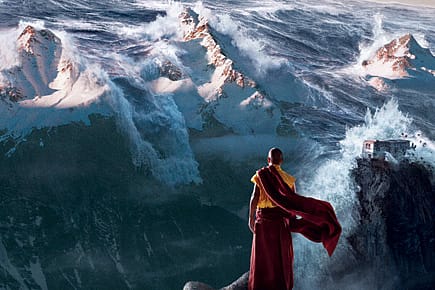Secret of an Honest Disaster Movie

2012 is a great disaster movie because it does not try to appease women.
Very few things in the world interest men. Fewer still among socially acceptable activities. I am not counting men who read Jane Austen, who know what mauve is, who buy curtains or rearrange furniture in their homes voluntarily, the evolved men or the renaissance men. I am talking about regular men, the husband delinquents. For us, a good disaster movie is a rare, precious fortune. It is both familiar and new—the first hints of an impending calamity, the scientific explanation of the disaster by an extra to another, who then exclaims, 'Shit, get me the President', the spectacular violence of visual effects, and the eventual escape of the main characters. Since nature is the killer here, somehow it is not savage and we leave the theatre without an ache in the heart or rage against bad persons.
For reasons that may not interest you, I love watching a disaster movie alone, without my wife in the next seat (or your wife, for that matter). Such a chance came this Sunday and it was inevitable that I would rush to watch 2012. The director, Roland Emmerich, had previously made 10,000 BC, one of the most moronic films ever, and before that The Day After Tomorrow, which was a mediocre disaster movie. But I had seen YouTube videos of 2012, and I knew that if a tsunami was going to engulf the Himalayas, I had to watch it on the biggest screen possible.
Imran Khan: Pakistan’s Prisoner
27 Feb 2026 - Vol 04 | Issue 60
The descent and despair of Imran Khan
Outside the hall, as I waited to get in, I felt an intense excitement. The earth's crust was growing unstable, continental plates would rise, whole oceans would shift. I heard a girl who was standing near me tell her friend, "It's so scary." I almost liked her, but then she was looking at the poster of Paa and commenting on the enormous head of Amitabh Bachchan who was riding on Abhishek's back. It was ridiculous. Mega tsunamis were going to wipe out whole countries, and what scared her was someone's head. From the conversations of the other women, it was evident to me that they had not researched the film, unlike their men who, I am sure, had seen the various trailers of 2012 on the internet, and knew the ancient Mayan myth, reflected gloomily in the words of the American president: 'The world, as we know it, is going to end.'
A disaster movie is possible because of the love of men. Yet, filmmakers try to appease women by introducing sentiments that irritate men. There is this fear in Hollywood that no matter what it does, it needs the support of women. So, studios bring love and tears in the middle of a calamity, they complete a love story in the heart of the climax. It is a great injustice to men. In a disaster movie, I don't want to hear, 'Should have told you this earlier baby, I love you.' What I would rather hear is, 'Shit, get me the President.'
I was certain 2012 would be no different from other phoney disaster movies. But in the dark hall, I waited in silence, showing respect to what I was about to witness. The girl in the next seat was chatting with people in the row behind. She was getting married this month. 1,800 guests at the wedding. Cards were in the car. But fortunately, she shut up when the film started.
Within minutes I knew that this was going to be the best disaster movie I had ever seen. In a world that pandered to women, this was a man's film that did not pretend to be anything else. It quickly promised a total catastrophe that cannot be avoided; it had tsunamis a mile high—one of them engulfs the whole of India; the earth breaks into giant cracks as big as canyons; and the male lead is a loser whose ex-wife is sexy, who still appears to like him more than her successful new husband, a cosmetic surgeon.
There are hilariously stupid scenes, especially involving India. But 2012 is still a great disaster movie because it does not waste time trying to give female characters something important to do, does not create equal job opportunities for them, it does not waste time setting up love or reunion, it does not want to impress reviewers through intelligent storytelling.
But there is a ludicrous moment towards the end of the film. Fifty seconds before a mega tsunami is expected to hit a ship, a girl consummates her high opinion of a man by asking him for a kiss.
The scene was punished by the loud echoing laughter of men.
